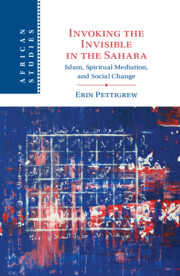Book contents
- Invoking the Invisible in the Sahara
- African Studies Series
- Invoking the Invisible in the Sahara
- Copyright page
- Epigraph
- Dedication
- Contents
- Illustrations
- Acknowledgments
- Notes on Orthography and Translation
- Abbreviations
- Introduction
- Part I Knowledge and Authority in Precolonial Contexts
- Part II Rupture, Consonance, and Innovation in Colonial and Postcolonial Mauritania
- Part III Articulating Race, Gender, and Social Difference through the Esoteric Sciences
- 5 Desert Panic
- 6 Sui Generis
- Epilogue
- Glossary
- Bibliography
- Index
- African Studies Series
5 - Desert Panic
Bloodsucking Accusations and the Terror of Social Change
from Part III - Articulating Race, Gender, and Social Difference through the Esoteric Sciences
Published online by Cambridge University Press: 19 January 2023
- Invoking the Invisible in the Sahara
- African Studies Series
- Invoking the Invisible in the Sahara
- Copyright page
- Epigraph
- Dedication
- Contents
- Illustrations
- Acknowledgments
- Notes on Orthography and Translation
- Abbreviations
- Introduction
- Part I Knowledge and Authority in Precolonial Contexts
- Part II Rupture, Consonance, and Innovation in Colonial and Postcolonial Mauritania
- Part III Articulating Race, Gender, and Social Difference through the Esoteric Sciences
- 5 Desert Panic
- 6 Sui Generis
- Epilogue
- Glossary
- Bibliography
- Index
- African Studies Series
Summary
Chapter 5 describes a phenomenon only found in the Sahara known as sell, or bloodsucking and the extraction of essential life forces, arguing that accusations of sell and their related events thus offer an opportunity to view local conceptions of social identity and related fears about shifts in hierarchy, old hostilities between lineages, as well as understandings of the nature of health and illness. While Arabic sources document the existence of bloodsucking at least as early as the fifteenth-century, the colonial archive provides the most concentrated number of records that demonstrate how bloodsucking was a lived and feared reality for desert communities during the colonial period. From these Saharan sources, a fuller understanding emerges of how desert communities envisioned the political and spiritual forces of their social worlds during periods of famine, economic stagnation, and domestic tension. Both the accusation of sell and the l’ḥjāb used to counter it signal the contestation of a society’s status quo.
- Type
- Chapter
- Information
- Invoking the Invisible in the SaharaIslam, Spiritual Mediation, and Social Change, pp. 187 - 221Publisher: Cambridge University PressPrint publication year: 2023

